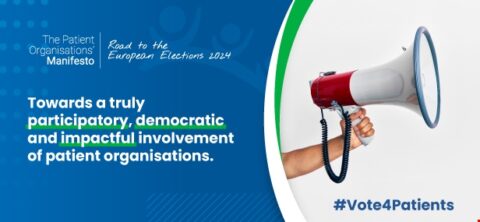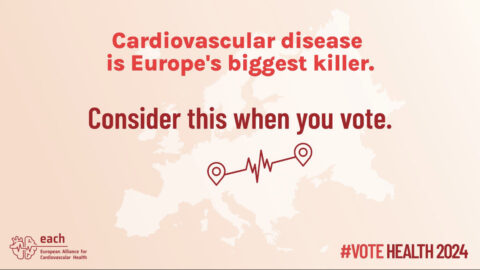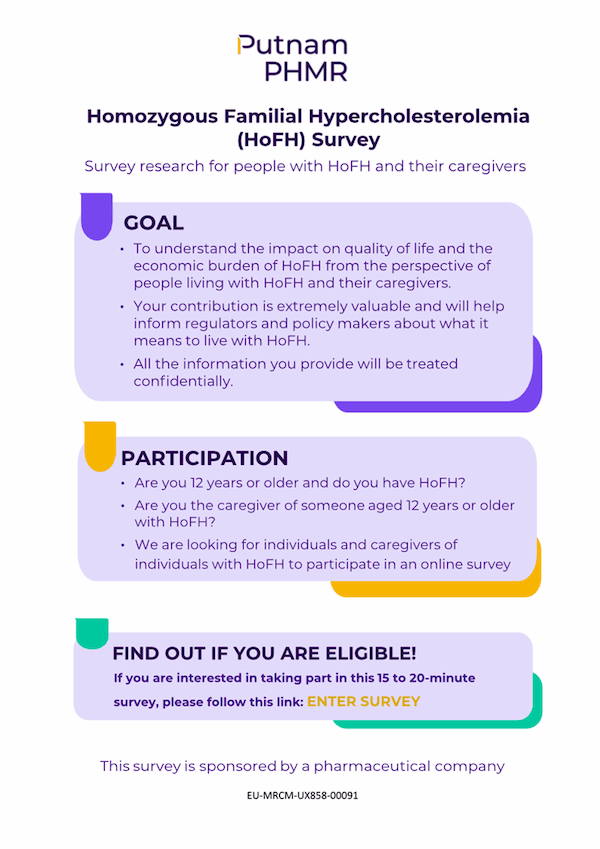Between 6–9 June 2024, millions of Europeans will go to the polls and their votes will shape the future of the Union. Members of the European Parliament (MEPs) make decisions that affect the daily lives of everyone, a considerable amount covering important healthcare issues that have a direct impact on patient organisations and patients' lives. The elections present a critical opportunity for the FH Europe Foundation community in the EU.
This is YOUR opportunity to use your vote and help prioritise public health in the EU!
Did you know that cardiovascular disease (CVD) is the number one killer in Europe, and beyond? In the EU, it accounts for 36% of all deaths and impacts the lives of some 60 million people. Yet, there is no dedicated EU plan in place to tackle CVD. Familial hyperlipidaemias (both forms of FH, elevated Lp(a) and FCS) are genetic, inherited conditions. If undetected and unmanaged, they lead to serious heart health consequences, especially FH and elevated Lp(a).
Among the familial hyperlipidaemias FH Europe Foundation (FHEF) advocates for, there are also 2 rare and severe disorders (HoFH and FCS). To date, the 30 million Europeans living with a rare disease in Europe still have high unmet needs in a wide range of areas, including accessing early and appropriate diagnosis, treatment and health and social care. Rare diseases are an area where EU action can have exceptional added value, as knowledge and data are scattered and scarce, and national action is limited.

For our community specifically, CVD prevention through early screening programmes and early detection of familial hyperlipidaemias (FH paediatric screening and Lp(a) level measurement) have been in focus.
In addition in the past weeks, FHEF also signed two petitions supporting the efforts around public health in the EU.
First of them was the EURORDIS-led #ActRare2024 pledge, which contains 8 strategic areas with the ultimate goal of addressing the high unmet needs of the rare diseases community.


The EPF manifesto has been translated into several languages and can be accessed as we as endorsed here.
But what are political parties saying about public health in their manifestos?
To answer this question, the European Public Health Alliance (EPHA) have critically assessed 5 EU parties' manifestos on health-related measures, across 16 key topics.
You can read the full analyses for each party manifesto (listed below) including a 2-page summary for each party on their webpage.
FHEF is calling on its members to take action and to support the above pledges. Use your vote and make health the European priority next term!
Patient Ambassador Maria Nassif participated in the 4th edition of HealthTech for Patients event on May 16, 2024, hosted by HealthTech for Care. She shared her journey with HoFH, highlighting mental health challenges and daily struggles of living with a chronic illness.
Maria emphasized the need for early diagnosis, personalized treatment, universal access to care, effective communication with healthcare professionals, psychological support, and a strong patient community. Her participation underscores FH Europe Foundation's commitment to raising awareness and advocating for comprehensive patient care.
On 16 May 2024, I participated in the 4th edition of Health Tech for Patients organized by Health Tech for Care as FH Europe Foundation Patient Ambassador. I took part in the first round table which tackled the impact of illness on mental health: from screening to post-treatment. As a HoFH patient, I have talked about my journey with this rare disease from diagnosis until today. Having a chronic disease has affected my self-image and physical ability. The symptoms that I feel daily (i.e. racing heartbeat, tightness of chest and constant fatigue) make me wonder whether I am having a heart attack or stress especially since I underwent a double bypass open heart surgery at 24 years old. This constant fear put me in a freeze-or-flight state causing me panic attacks and depressive episodes. Our disease affects every aspect of our life (food diet, activities, outings, social life) and our future (choosing a partner, having a baby, work activity …). It takes a huge mental effort to balance between our lifestyle and our commitment towards our well-being.
Sharing my story on a global level and being the patients’ voice is very important to me. It helps bring more awareness about HoFH since it’s a silent disease and its symptoms are not visible on the outside. The most crucial part of my talk was the conclusion where I listed what we, as patients, need to be put in place to help us alleviate the burden of having a chronic disease and its effects on our mental health which included:
About HealthTech for Patients
HealthTech for Patients (HTFP) serves as a platform for patients to express their needs and discover innovations in healthcare by reuniting health innovation stakeholders. Organised by HealthTech For Care, the event aims to bridge the gap between healthcare professionals and patients, establishing an open exchange platform that enables professionals to better understand the perspectives, needs, and experiences of patients. The event brings together all the players involved in the medical innovation value chain, which enables better coordination within the European health ecosystem to accelerate the deployment of innovative solutions for all patients.
Knowledge about how HoFH impacts people’s lives is scarce. There have been limited studies conducted to understand how this ultra-rare condition affects diagnosed individuals and their family members, who often act as caregivers. Having identified this knowledge gap, back in 2023 FH Europe was pleased to be involved in the development of a survey supporting a research project designed to better understand the challenges faced by the HoFH community. Our international HoFH Patient Ambassadors were actively contributing to the process of the research survey design, which was launched a year ago in English. Now we are pleased to share it in additional 5 languages and to invite you to take part in it.
But first we wish to share more information to help anyone interested make an informed decision about their participation.

The survey is being conducted by a scientific research consultancy called Putnam PHMR, which was commissioned by a pharmaceutical company, which we collaborate with.
The survey will be open to anyone, who is:
All results from the survey will be anonymized and no personal data will be shared. This means that the research team and the company funding the survey will not see any personal details. Information given during the survey cannot be used in any way to identify an individual.
The results of this survey will inform regulators and health policy makers, on what it means to live with HoFH, or to care for someone living with HoFH. The findings will also be published and be made available through Open Access for the benefit of people with HoFH and anyone with an interest in the area.
The goal of this survey is to provide critical information about what it means to live with HoFH to help inform regulators and policy makers, who make decisions affecting the treatment and care of people living with HoFH. It is also intended to help identify gaps in support to promote new initiatives.
Arabic: https://phmr.eu.qualtrics.com/jfe/form/SV_6JUTxu4BWBd8e0u?Q_Language=AR
English: https://phmr.eu.qualtrics.com/jfe/form/SV_6JUTxu4BWBd8e0u
French: https://phmr.eu.qualtrics.com/jfe/form/SV_6JUTxu4BWBd8e0u?Q_Language=FR
German: https://phmr.eu.qualtrics.com/jfe/form/SV_6JUTxu4BWBd8e0u?Q_Language=DE
Italian: https://phmr.eu.qualtrics.com/jfe/form/SV_6JUTxu4BWBd8e0u?Q_Language=IT
Spanish: https://phmr.eu.qualtrics.com/jfe/form/SV_6JUTxu4BWBd8e0u?Q_Language=ES-ES
-- Deadline to respond is 31st of July. --
For additional questions please contact Elsie Evans (elsie@fheurope.org), FHEF Education Manager.